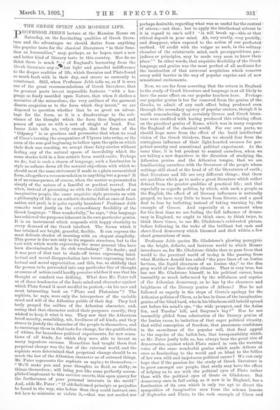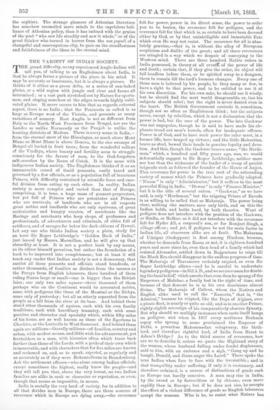THE GREEK SPIRIT AND MODERN LIFE.
pROFESSOR JEBB'S lecture at the Mansion House on Saturday, on the fascinating qualities of Greek litera- ture and the advantages we should derive from anything like popular taste for the classical literatures "in their func- tion as humanities," may, perhaps, as he hopes, start a new and better kind of literary taste in this country. Nor do we think there is much f-.^r of England's borrowing from the Greek literature any oil!hat light and graceful indifference to the deeper realities of life, which Socrates and Plato found so much fault with in their day, and strove so earnestly to counteract. Still, when Professor Jebb tells us, as if it were one of the great recommendations of Greek literature, that its greatest poets invest impossible features "with a lan- guage so finely moulded upon Nature, that when it clothes a narrative of the miraculous, the very outlines of the garment disarm suspicion as to the form which they invest," we are disposed to question whether that be as great an advan- tage for the form, as it is a disadvantage to the sub- stance of the thought which the form thus disguises and passes off upon us with a sort of sleight of hand. Pro- fessor Jebb tells us, truly enough, that the form of the " Odyssey " is so gracious and persuasive that when we read of Oirce's turning the companions of Ulysses into swine, or the oxen of the sun-god beginning to bellow upon the spits on which their flesh was roasting, we accept those fairy-stories without feeling any of the natural spasm of incredulity which the same stories told in a less artistic form would excite. Perhaps we do ; but is such a charm of language, such a fascination in style as softens down all the natural objections with which we should meet the same statement if made in a plain unvarnished form, altogether a recommendation to anything but a poem ? It is of no consequence, of course, when the matter so presented is simply of the nature of a fanciful or poetical marvel. But when, instead of presenting us with the childish legends of an imaginative people, the same exquisite style presents us with a philosophy of life or an Eesthetic doctrine full at once of fasci- nation and peril, is it quite equally harmless P Professor Jebb remarks most justly on the extraordinary flexibility of the Greek language. "How wonderfully," he says, "this language has achieved the purposes inherent in its own particular genius. It is an instrument which responds with happy elasticity to every demand of the Greek intellect. The forms which it has retained are bright, graceful, flexible. It can express the most delicate shades of meaning with an elegant simplicity. This power is duo not only to its organic structure, but to the tact with which words expressing the same general idea have been discriminated in its rich vocabulary." No doubt ; and it was part of that tact to shade-off terms expressing intel- lectual and moral disapprobation into terms expressing intel- lectual and moral appreciation, and this, too, so skilfully that the person to be persuaded into any particular line of thought or course of action could hardly perceive whither it was that his thought or conduct was drifting. What does Mr. Pater tell us of those tendencies of the Ionic mind and character against which Plato found it most needful to protest,—in his new and most interesting book on "Plate and Platonism" P The sophists, he says, were only the interpreters of the variable mind and will of the Athenian public of their day. They had truly gauged the calibre of the Athenian character, and, seeing that that character suited their purposes exactly, they wished to keep it what it was. They saw that the Athenians loved novelty, sensibility, wit, liveliness of all kinds, and they strove to justify the character of the people to themselves, and to encourage them in that taste for change, for the gratification of whims, for hazardous political experiments, for new sensa- tions of all kinds, for which they were able to invent so many ingenious excuses. Heraelitus had taught them that perpetual change was the law of the external world, and the sophists were determined that perpetual change should be as much the law of the Athenian character as of outward things, Mr. Pater represents the sophists as saying to themselves,— " We'll make you and your thoughts as fluid, as shifty, as things themselves ; will bring you like some perfectly accom- plished implement to this carriZre ouverte, this open quarry for the furtherance of your personal interests in the world." And, adds Mr. Pater : "If old-fashioned principle or prejudice be found in the way, who better than they could instruct one, not how to minimise or violate it,—that was not needed nor
perhaps desirable, regarding what was so useful for the control of others,—not that ; but to apply the intellectual solvent to it in regard to one's self ? 'It will break up—this or that ethical deposit in your mind. Ah, very neatly, very prettily, and disappear, when exposed to the action of our perfected method. Of credit with the vulgar as such, in the solitary chamber of the aristocratic mind, such presuppositions, pre- judices or principles, may be made very soon to know their place.'" In other words, that exquisite flexibility of the Greek language and genius was the most perfect of all mediums for the inculcation of that universal scepticism which removee every solid barrier in the way of popular caprice and of new sensational excitements.
Now, we are far from asserting that the return in England to the study of Greek literature and language is at all likely to have the same effect on our popular teachers here. Perhaps our popular genius is too far removed from the genius of the Greeks, to admit of any such effect being produced even through the secondary agency of popular orators, though it is worth remembering that certainly Greece and Greek litera- ture were credited with having produced this relaxing effect on the practical genius of Rome, which was in many respects the England of the classical world. For our own parts, we should hope more from the effect of the lucid intellectual vision of the Greek thinkers, than we should fear from the contagious influence of their light-hearted excuses for per- petual novelty and sensational political experiment. At the same time, it is but prudent to remind ourselves, when we are taking a new departure in the direction of studying the Athenian genius and the Athenian tongue, that we are familiarising ourselves with the literature of the people whose writings still stand at the head of all the literatures of earth ; that literature and life are very different things ; that there are qualities which go to make a great literature which rather detract from the greater qualities of practical life ; and that especially as regards politics, by which, with such a people as the English, the effect of all literary influences is naturally gauged, we have very little to learn from Greece, and a good deal to lose by imitating, instead of taking warning by, the example of Greece. And especially at a moment when for the first time we are feeling the full influence of democ- racy in England, we ought to think once, to think twice, to think three times, to use Mr. Gladstone's celebrated phrase, before following in the wake of the brilliant but rash and short-lived democracy which bloomed and died within a few short generations of men.
Professor Jebb quotes Mr. Gladstone's glowing panegyric on the bright, definite, and lustrous world to which Homer introduces us, for Mr. Gladstone thinks that to pass from that world to the practical world of to-day is like passing from what Matthew Arnold has called "the pure lines of an Ionian horizon, the liquid clearness of an Ionian sky," to the dim grey world of our Bast-windy climate. That is very true, but has not Mr. Gladstone himself, in his political career, been insensibly as much influenced by the wilfulness and caprice of the Athenian democracy, as he has by the clearness and brightness of the literary genius of Athens ? Has he not followed as eagerly in the steps of Grote's apology for the Athenian polities of Oleon, as he has in those of the imaginative
genius of the blind bard, who in his blindness still beheld spread out before his mind's eye, "the wide prospect, and the Asian fen, and Tmolus' hill, and Smyrna's bay P" Has he not insensibly glided from admiration of the literary genius of the Ionian races, to imitation of that eager political vivacity, that wilful conception of freedom, that passionate confidence in the sacredness of the popular will, that final appeal to the caprice of the ballot-box, that irresponsibility which, as Mr. Pater justly tells us, has always been the great vice of democracies, against which Plato raised in vain the warning voice of the same wonderful genius which made Athens at once so fascinating to the world and so blind to the follies of her own wild and impetuous political career P We can only hope that if the passion for the study of Greek literature is to grow amongst our people, that study may have the effect of helping us to see with the political eyes of Plato rather than with the political eyes of Grote or Gladstone. But democracy once in full swing, as it now is in England, has a fascination of its own which is only too apt to divert the
sympathies of imaginative men from the solemn lessons of Sophocles and Plato, to the rash example of Oleon and
the sophists. The strange glamour of Athenian literature has somehow reconciled more minds to the capricious bril- liance of Athenian policy, than it has imbued with the genius of the poet 'who saw life steadily and saw it whole," or of the great thinker who turned in horror from the vox populi of a changeful and unscrupulous city, to gaze on the steadfastness and faithfulness of the ideas in the eternal mind.



































 Previous page
Previous page